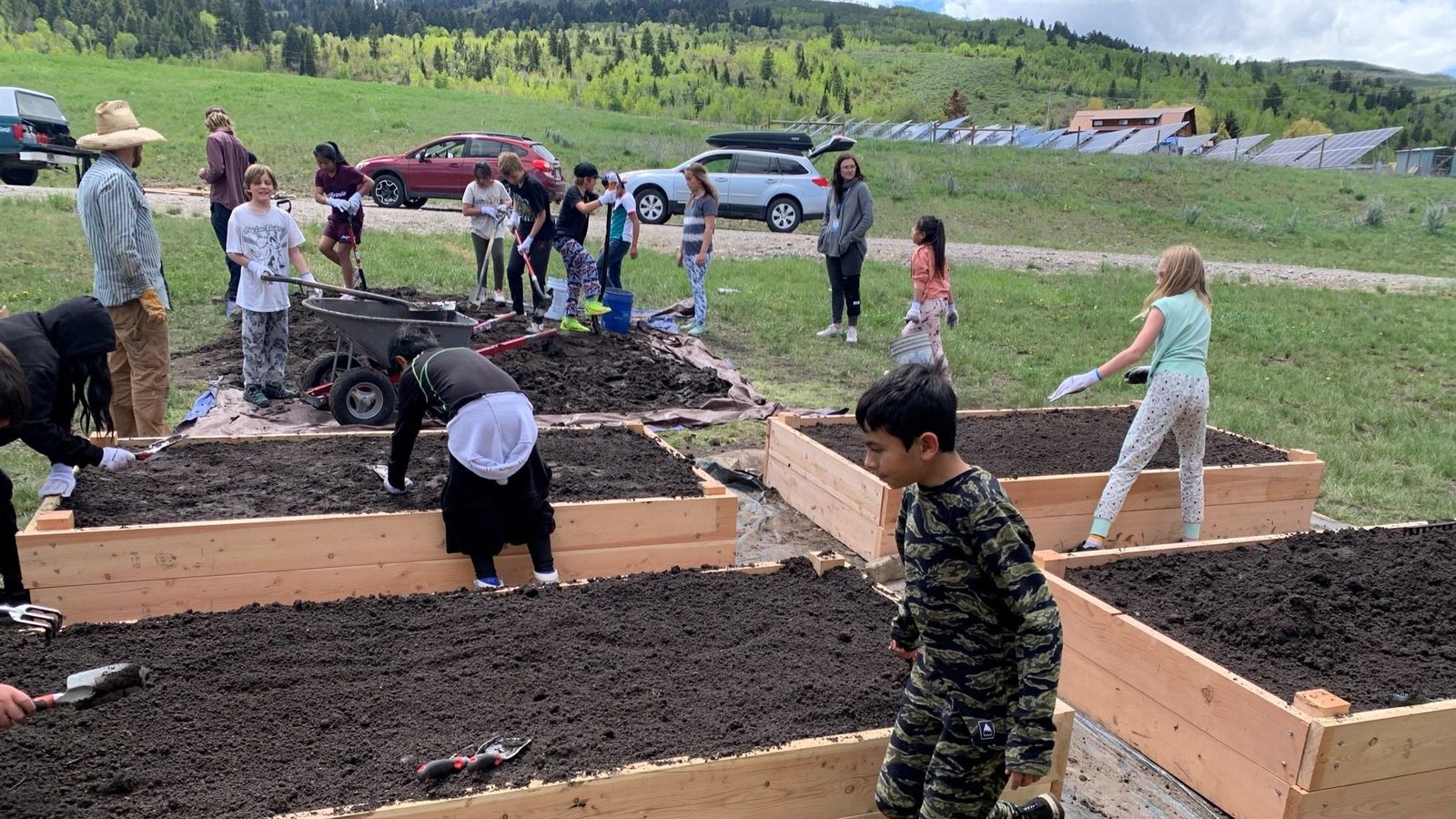Initiatives Grants
Sections
Program Details
- Grant funds must advance the goals of one or more of the Community Foundation’s Initiatives: Behavioral Health, Housing Solutions, and Education & Families. (See Initiative Goals below.)
- Applicant must be a 501(c)(3) nonprofit, government entity, or other IRS-recognized charitable organization serving Teton County, Wyoming OR be fiscally-sponsored by an entity that meets these requirements. (No for-profit applicants, even with a qualified fiscal sponsor.)
- Grant funds must be used exclusively in Teton County, Wyoming. (In select situations, grants may benefit people working in Teton County, Wyoming who live in neighboring communities.)
- Funds may not be used for debt retirement or religious or political activities
- Grant funds may not be used for work that has already been completed
- Required 30-minute meeting with Foundation staff (July-August)
The Foundation’s three Initiatives are in varying stages of evolution, having been launched at different times post-pandemic. The basis of each Initiative is a collaborative working group that has been actively involved in the development of the frameworks below.
- Purpose, Vision, Mission, and Values
- Approach: The Teton Behavioral Health Alliance works to improve the behavioral health care system in Teton County, Wyoming at a systems level through high-level, cross-sectoral collaboration. TBHA facilitates community-wide actions that enhance prevention, treatment, and crisis response efforts while addressing the gaps and inequities in the system to benefit all who live and work in Teton County.
- Goals
- Availability of Affordable Care: Increase the availability and affordability of care by trusted providers that reflect the diversity of our community.
- Community Education and Engagement: Collaborate on coordinated outreach and engagement to expand and reinforce prevention efforts, especially among and within historically marginalized populations
- Crisis Response and Post Crisis Care: Improve patient centered, culturally-competent, and trauma-informed crisis response and post-crisis care
- Navigation and Care Coordination: Improve the ease with which community members identify, connect with, and refer between behavioral health services.
- Provider Capacity and Wellbeing: Invest in supports that increase provider capacity and wellbeing
- Youth-Focused Services: Increase availability and integration of youth-focused services that are responsive to current needs
EDUCATION & FAMILIES INITIATIVE
The following is under development by the Expanded Learning Collective (formerly Systems of Education).
- Purpose. The Expanded Learning Collective believes that access to out-of-school learning has the power to close the educational opportunity gap and support the success and fulfillment of youth in Teton County, Wyoming. We work to address barriers to access, support educator recruitment and retention, and build stronger relationships between providers and their constituents.
- Approach
- Foster opportunities and address challenges for out-of-school time through collective action.
- Break down silos and promote collaboration to ensure we are learning with and from each other and our community.
- Impact learners through programming and by engaging with the broader context that supports their success, including educators, institutions, families.
- Ground our work in data, stories, and the wisdom and experiences of community members to ensure equitable access to out-of-school learning.
- Goals
- Improving Equitable Access to Programming: Identify and address systemic barriers to accessing out-of-school programming that perpetuate inequities within our community.
- Establishing and Enhancing Pathways and Supports for Educators: Promote the recruitment, training, and retention of educators to provide the highest quality expanded learning experiences.
- Fostering Stronger Community Relationships: Invest in strategies to strengthen relationships between providers and constituents to ensure programming is relevant to community needs and that families and caregivers can navigate the programming landscape.
- Addressing Critical Gaps in Out-of-School Programming: Build capacity to meet the expanded learning needs of Teton County youth by identifying and addressing gaps in services.
- Purpose: The Housing Solutions Initiative champions collaborative solutions to increase the availability, accessibility, and diversity of affordable housing options in Teton County and Jackson. This work is grounded in the belief that safe, stable housing is essential to community well-being, economic resilience, and a thriving local workforce.
- Approach: The Housing Solutions Initiative supports local housing efforts by addressing the root causes of housing challenges and focusing funding on community-identified needs. It aims to create space for shared learning, aligned goals, and collective action among cross-sector partners working to advance housing solutions.
- Goals
- Expand Equitable Access to Housing: Fund strategies that close affordability gaps — particularly for moderate-income workers who are not served by current programs — and increase housing opportunities across income levels, household types, and life stages.
- Build a Unified, Data-Informed Housing System: Invest in data tools, research, and collaborative infrastructure that foster shared understanding, track progress, and guide decision-making across the housing ecosystem.
- Activate Cross-Sector Solutions to Increase Housing Supply and Stability: Support public-private partnerships, collaborative employer-led initiatives, and pilot innovative funding models that increase the supply of homes, preserve housing for locals, and create more stability in the housing market.
- Increase Mobility and Stability Within the Housing System: Support solutions that help residents move more easily within the housing system as needs change — including downsizing, upsizing, or transitioning between deed-restricted and market-rate homes. Fund strategies to preserve existing housing for the local workforce, such as preservation funds and buy-downs.
- Foster a Shared Housing Vision Across Sectors: Promote efforts that shift public understanding of housing as both an economic driver and a social good, elevate diverse community voices, and build shared narratives that generate trust, align stakeholders, and create momentum for collaborative solutions.
- Support Policy Change for Community Housing: Advance efforts to modernize policies and internal organizational practices that enhance quality of life and economic opportunities for current and future renters and homeowners.
Systems change is the “north star” of Catalyst grantmaking impact. The Community Foundation recognizes that systems change takes time, partnerships, and resources, and that it comes in iterations. We are pleased to partner with local organizations in various stages of systems change work.
Initiatives Grants prioritize funding for compelling, high-impact proposals in the following order:
- Systems change work (discussed here; also see Examples of Systems Change Work below)
- Innovation within a system
- Work that is critical to meet a pressing community need (though possibly not systems changing)
Preferences and Considerations
The strongest applications will feature:
- Compelling strategy for systems change or other innovation, supported by data if available
- High likelihood of yielding meaningful impact
- Strategic partnerships
- Diversity of funding sources and a plan for ongoing funding
- Applicant has organizational capacity, stability, responsible leadership, and a track record of programmatic success
- Alignment with:
- Community Foundation’s Strategic Plan and Values
- 2024 Behavioral Health Report (Behavioral Health Initiative Grants only)
- Encouraged but not required: participation in an Initiative-specific working group – Teton Behavioral Health Alliance, Housing Collective, and/or Expanded Learning Collective
Exclusions
Requests for the following will not be considered:
- Affordable housing construction costs
- Youth out-of-school scholarships. The Community Foundation is the major funder of One22 Resource Center’s Youth Enrichment Scholarship (YES) program. Youth programming scholarship requests will not be considered through Catalyst Grants. Please connect with One22 Resource Center to become a YES partner.
Proposals that have been funded by the Community Foundation or requested within the past 12 months may not be resubmitted.
- High-impact programming focused significant community issues and their root causes (large numbers or disproportionately affected populations served)
- Capacity building for organizations to better meet the needs of underserved populations
- Implementation of strategic planning (not strategic planning itself – think “Series B” funding)
- Capital expenditures for organizations systemically addressing critical community needs (expenditure must have broad and enduring community benefit, or significantly support populations in need)
- Structural changes within organizations that will increase efficiency and impact in critical service areas (e.g. nonprofit mergers)
This is not a comprehensive list. The Community Foundation welcomes creative proposals that meaningfully advance Initiative goals.
Following are examples of past Initiatives Grants geared toward systems change:
Behavioral Health Initiative Grants
- $30,000 to address provider burnout and fragmented care at the inaugural Spring Collaborative Conference. Developed by and for the behavioral health community, this event brings together more than a dozen partners to strengthen organizational partnerships, shift resource flows, and build a more coordinated, resilient behavioral health system in Teton County. Grantee: The Mental Wellness Collaborative, in partnership with Mental Health & Recovery Services and Jackson Hole Therapy
- $61,000 to increase a sense of belonging and build resilience among gender diverse community members by utilizing a three pronged approach: support groups, community-building events, and professional development for providers as well as financial support for under/uninsured individuals. This work shifts mental models about gender diverse individuals by reducing discrimination and creating a more accepting and inclusive community. Grantee: Gender Diversity Wyoming, in partnership with 10+ nonprofit and business partners
Education & Families Initiative Grants
- $55,000 to build an inclusive and sustainable system to ensure children with disabilities can fully participate in summer camp alongside peers. This grant supports Inclusion Counselors in providing disability-specific safety and inclusion training to camp staff. Grantee: Teton Adaptive, in partnership with Coombs Outdoors and Teton County/Jackson Parks and Recreation
- $20,000 to implement a multi-age, integrated approach to expanding equitable math support in Teton County. This grant provides free tutoring to students with demonstrated academic and financial need, enrichment opportunities for advanced learners, and math learning tools for pre‑K students. Grantee: Elevate Math Wyoming, in partnership with Teton County School District #1, Teton Literacy Center, Children’s Learning Center and Wyoming Stargazing
Housing Solutions Initiative Grants
- $50,000 to align housing with environmental health. This grant supports infrastructure design to deliver clean drinking water to 26 new affordable homes at Horse Creek, where water access and quality concerns have historically limited affordable housing development. Grantee: JH Community Housing Trust, in partnership with Hoback Junction Water and Sewer District, Teton County Public Works, and the State of Wyoming
- $75,000 to pilot an affordable housing preservation model that improves home quality, safety, and accessibility for long-term homeowners earning at or below 80% MFI. Grant-funded work will inform a scalable approach with potential to extend across the broader deed-restricted homeownership portfolio over time. Grantee: Habitat for Humanity of the Greater Teton Area
Available funding for 2026 Initiatives Grants: TBA summer 2026
There is no specified minimum/maximum request. See Examples of Systems Change Work above for a ballpark range.
We expect a total applicant pool request that exceeds what is available to grant, making the application process highly competitive.
Specific dates TBA summer 2026
- July-August
- Develop proposal concept, solidify project partnerships
- Required 30-minute meeting with Foundation staff to discuss your proposal concept (required to submit an Expression of Interest in September). Our goal is to support applicants and ensure proposals’ alignment with Opportunities Grants.
- Mid-late September: Expression of Interest submission period (1 week)
- Mid October: Expression of Interest notifications; select organizations advance to written application
- Mid-late October: Written application period (2 weeks)
- Early December: 10-minute Q&A with review committee
- Mid December: Grant notifications
- Mid December to mid January: Grant contract and disbursement
Grantees are asked to submit a report after completion of their grant-funded work. Reporting dates are customized to individual project timelines. The Grant Report form focuses on impact, evaluation strategies, and budget alignment. Log into the CFJH Grant Applications platform to access your report form, which appears as the last task within the related application. Email Grants Associate Cindy Corona with any reporting questions.
Grantees must adhere to the Foundation’s Communication Requirements For Grant Recipients.
Initiatives Grants are funded by generous private donors seeking catalytic community advancements in the areas of behavioral health, housing, and youth out-of-school learning.
Please email grants@cfjacksonhole.org with questions about Initiatives Grants.




